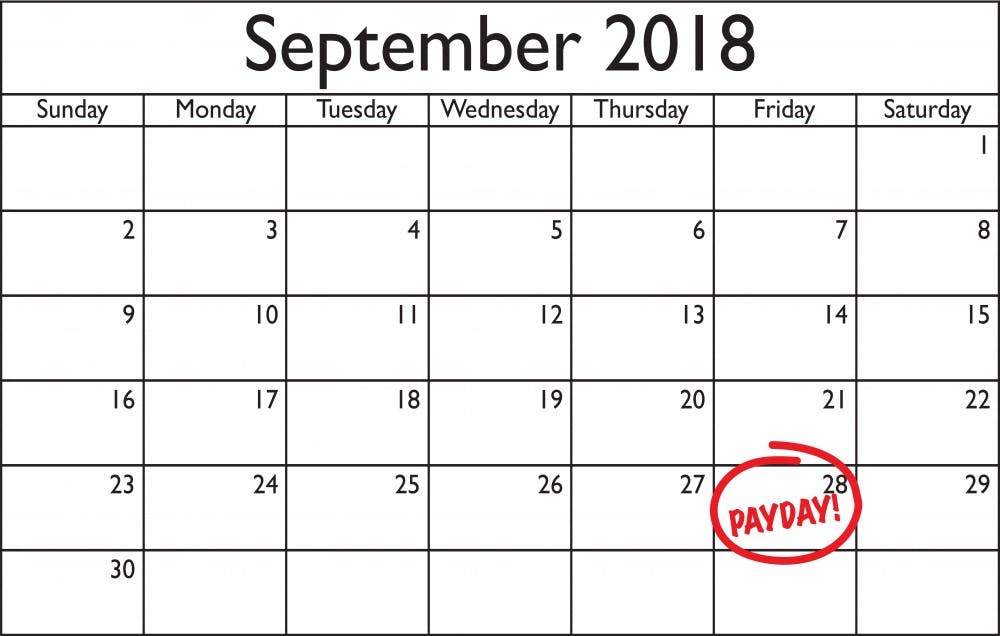In early August of 2015, Claire Ravenscroft arrived in Durham for her Ph.D. program in English. Coming from Ohio, she found herself paying a lot of bills.
Rent. Transportation. Shipping. Utility. Food. Furniture.
What made it worse was that she wouldn’t get paid for almost two months.
“I was moving from Ohio, where I had been working for a couple years,” Ravenscroft said. “But I didn't have any savings built up really to bridge the gap between late August and late September. So, when I found out that I wouldn't be paid for about two months after I arrived in Durham, it was incredibly stressful.”
Duke employees who are paid during the academic year have their first payday at the end of September. For graduate students, especially first-year graduate students, making ends meet without pay for the first month can be very difficult. Jessica Covil, also a Ph.D. student in English, described a similar experience to Ravenscroft’s.
“I was just turning 23 when I came and I had never rented my own apartment before,” she said. “I was getting all that set up for the first time and it's hard to do that without your pay, but the problem doesn't go away after your first year either.”
Some graduate students get a summer stipend, but there is still a gap between the last payment of the summer stipend to the first payment of the academic-year stipend, as well as a gap in between the last payment of the academic-year stipend and the first payment of the summer stipend.
Hannah Borenstein, a cultural anthropology Ph.D. student involved in the Duke Graduate Student Union, added that these gaps initially set students behind. She explained that the gaps can be especially difficult for students who have to travel to do field work over the summer because they have to pay for travel and housing in other countries—as well as sometimes rent in Durham—with money they don’t have yet.
“I have to still buy my plane ticket and all my other travel expenses basically before I go. That quickly racks up to over $2,000, but I don't have any money coming in to my bank account during May,” she said. “It's not even like I can work somewhere else cause I'm expected to be doing research somewhere in May.”
The three graduate students The Chronicle spoke with said the Graduate School was not transparent about these pay gaps and the impact the gaps may have before students come to Duke. However, some were given notice by their department.
“It basically set a tone for the rest of the year and for the rest of my time at Duke where I kind of understood that the University wouldn't be communicating with me in full transparency and full honesty,” Ravenscroft said.
The University’s response
John Zhu, senior public affairs officer and communications strategist for the Graduate School, listed ways in which the Graduate School tries to support students.
“We provide a competitive stipend and a number of other financial resources for Ph.D. students, such as coverage of tuition and mandatory fees for five years, full coverage of health insurance premiums for six years, childcare subsidies for students with children, an emergency fund for unexpected expenses that create a hardship and short-term loans for temporary needs,” he wrote in an email to The Chronicle.
The Graduate School offers the Helen and Gordon McKinney Emergency Loan, which is a $1,000 loan with a 3.5 percent fixed interest rate. According to the Graduate School’s website, students may only request three loans during their time pursuing a Ph.D. at Duke.
“We kind of see [the loan] as the Graduate School's acknowledgment that this is a problem,” Covil said, adding that the interest may be acting as a deterrent.
However, she added that the interest may have a point.
“People are nervous to take out loans in the first place. I know I was. That was the first loan that I had ever taken out actually,” Covil said. “I think having interest there is a way to ‘ensure’ that people aren't abusing the system when actually we probably all could use that money up front.”
Zhu confirmed that the loan is tailored to short-term needs, such as moving, but that there hasn’t been much demand for it.
Until recently, graduate students did not have the option to pay the loan in full, Covil added. But after pressure from the Graduate and Professional Student Council and the Duke Graduate Student Union, the administration now allows students to pay the loan in full without interest in the first two months. Interest begins accruing in the third month. Although Covil considered this to be progress, it does not adequately solve the pay gap issue for most people.
The Graduate School is looking to address this pay gap issue for incoming students, Zhu wrote, but it hasn't figured out how yet. He added that it was a long-term goal to provide year-round funding for all Ph.D. students in their guaranteed funding period.
“There are a number of logistical questions to address, but it is something university leaders are actively tackling,” he wrote. “The logistical questions have to do with complexities inherent in the payroll system at an organization as large as Duke, but we expect to be able to address this matter for the next entering class of Ph.D. students.”
Get The Chronicle straight to your inbox
Signup for our weekly newsletter. Cancel at any time.
Class of 2019
Editor-in-chief 2017-18,
Local and national news department head 2016-17
Born in Hyderabad, India, Likhitha Butchireddygari moved to Baltimore at a young age. She is pursuing a Program II major entitled "Digital Democracy and Data" about the future of the American democracy.

